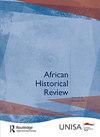Contemporary Issues in Africa’s Development: Whither the African Renaissance?, edited by Richard A. Olaniyan and Ehimika A. Ifidon
IF 0.1
Q3 HISTORY
引用次数: 0
Abstract
There is a wide corpus of literature on Africa’s developmental issues, for example Morten Jerven's Poor Numbers (University of Cape Town Press, 2013); Dambisa Moyo’s Dead Aid: Why Aid Is Not Working and How There Is a Better Way for Africa (Penguin Books, 2015); Emmanuel Akyeampong et al.’s Africa's Development in Historical Perspective (Cambridge University Press, 2014); and Munyaradzi Mawere’s Development Naivety and Emergent Insecurities in a Monopolised World: The Politics and Sociology of Development in Contemporary Africa (Langaa RPCID, 2018), such that one is legitimately tempted to ask: What are Olaniyan and Ifidon adding to the literature? Based on the foregoing, expectations are already heightened whenever one picks up another book on Africa’s development trajectory. This is because there are very deep pockets of disillusionment with Africa’s quest for development since the 1960s waves of decolonisation that were supposed to lift Africa out of the mire of underdevelopment, an uncontested legacy of colonisation. With misses with regard to Millennium Development Goals, which came to a close in 2015, and given uncertainty regarding the achievement of Sustainable Development Goals, coupled with deepseated Afroscepticism and the impoverished lot of large sections of the African population, issues of Africa’s development are very topical. Therefore, any book that puts Africa’s development under a searing microscope and goes beyond lamentations and proposes developmental solutions is a worthy read and an invaluable contribution to development policy. However, does this book fit in this category? In other words, does it rise to the occasion or expectations?非洲发展中的当代问题:非洲文艺复兴在哪里?,Richard A.Olaniyan和Ehimika A.Ifidon编辑
有大量关于非洲发展问题的文献,例如Morten Jerven的《贫困数字》(开普敦大学出版社,2013年);Dambisa Moyo的《死亡援助:为什么援助不起作用以及如何为非洲找到更好的方法》(企鹅出版社,2015年);Emmanuel Akyeampong等《历史视野中的非洲发展》(剑桥大学出版社,2014);以及Munyaradzi Mawere的《垄断世界中的发展幼稚和紧急不安全:当代非洲发展的政治和社会学》(Langaa RPCID,2018),人们不禁会问:奥拉尼扬和伊菲顿在文学中添加了什么?基于上述情况,每当人们拿起另一本关于非洲发展轨迹的书时,人们的期望就已经提高了。这是因为自20世纪60年代非殖民化浪潮以来,人们对非洲寻求发展的幻想破灭了,这些浪潮本应将非洲从不发达的泥潭中解救出来,而不发达是殖民主义无可争议的遗产。由于未能实现2015年结束的千年发展目标,加上实现可持续发展目标的不确定性,再加上根深蒂固的非洲恐惧主义和非洲大部分人口的贫困,非洲的发展问题非常热门。因此,任何一本将非洲发展置于严酷的显微镜下,超越哀叹,提出发展解决方案的书都是值得一读的,也是对发展政策的宝贵贡献。然而,这本书属于这一类吗?换言之,它是否符合场合或预期?
本文章由计算机程序翻译,如有差异,请以英文原文为准。
求助全文
约1分钟内获得全文
求助全文

 求助内容:
求助内容: 应助结果提醒方式:
应助结果提醒方式:


